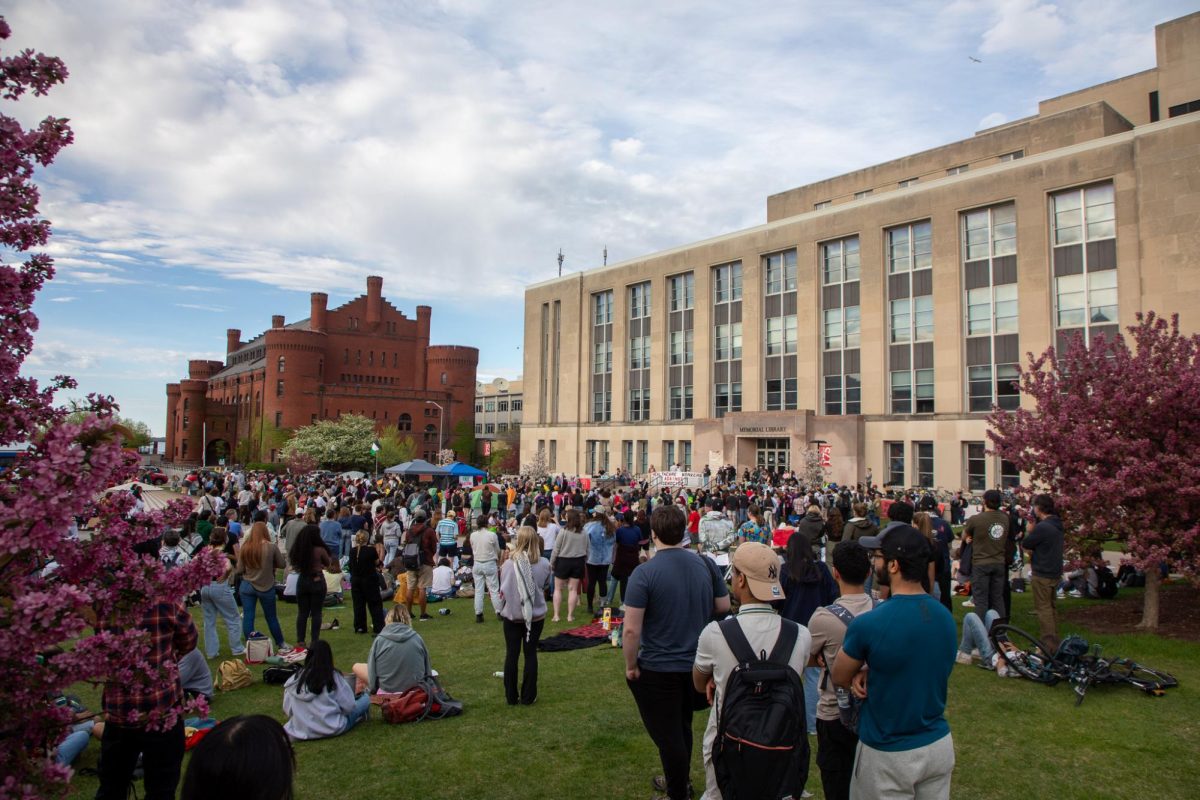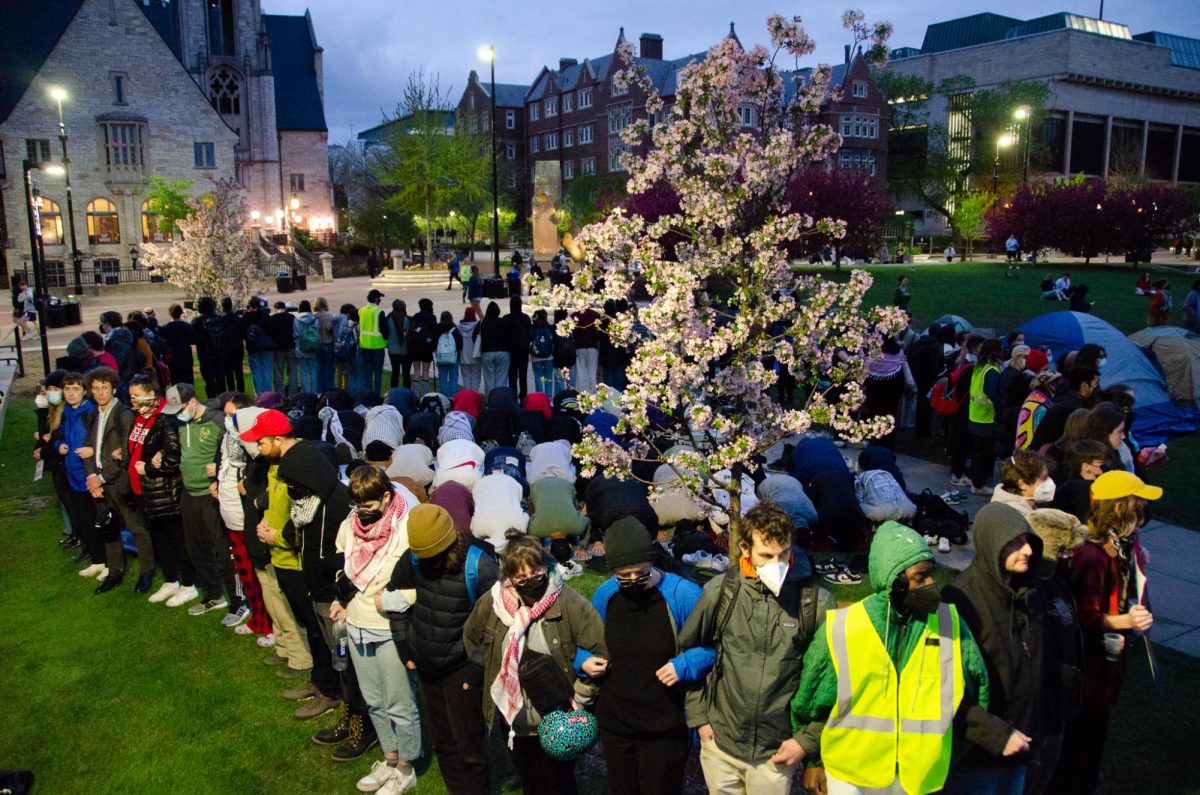Across the nation, data showing worsening student mental health has led colleges and universities to rethink their systems in place to support students. This has led to a push to fill gaps in mental health services by expanding and reenvisioning support systems.
This push comes after the COVID-19 pandemic shined light on “very high rates” of depression and anxiety among high school and college students, researcher with the University of Wisconsin Center for Healthy Minds Matt Hirshberg said.
In shining light on elevated rates of mental health challenges among students, the pandemic revealed how colleges and universities had long felt overwhelmed by the demands on their mental health systems and resources, according to Hirshberg.
Hirshberg said the pandemic influenced mental health systems on college campuses by raising awareness of the situation at hand.
“Prior to the pandemic, there was very little awareness of the fact that colleges and universities are struggling to support the needs of students,” Hirshberg said. “Awareness of that has increased a lot because of the pandemic.”
This increased awareness has contributed to the destigmatization of mental health, helping facilitate the expansion of services.
“Awareness of the magnitude of the problem is definitely an impetus to try to find more services, and explore new approaches that might be able to support youth mental health,” Hirshberg said.
UW–Madison maintains application fee as other UW campuses remove it
Room to grow adolescent support
Despite efforts to expand mental health efforts, accessibility gaps for mental health services remain on college campuses. Adolescents have expressed concern over this, with 28% of high school students currently applying, or considering applying, to college citing mental health concerns as a reason they may choose to delay enrollment — or opt out of college entirely — in a survey conducted by education company EAB.
Respondents among the 6,330 U.S. students in grades 9-12 surveyed September 2023 noted various strategies and support systems that could be incorporated on campuses to “make the decision to enroll easier.” Among them — the inclusion of mental health sick days, programs to facilitate social connections, on-campus counseling centers, simplified leave policies and free mental health apps/online tools.
In response to the survey’s findings, EAB Vice President Michael Koppenheffer called on colleges and universities to “do a better job” acknowledging adolescent mental health struggles. He also encouraged increased communication between universities and prospective students about the mental health services available upon arrival to campus.
“Colleges must also do a better job of communicating with students about the full range of mental health resources available to them,” Koppenheffer said in January.
For high school students transitioning to college, the need for mental health services becomes more apparent. Colleges and universities feel this need, but may not always be equipped to address it, Hirshberg said.
“Transitionary periods tend to be periods where the need is acute,” Hirshberg said. “It’s felt quite strongly by colleges and universities because they have this population of adolescents who for the first time are really on their own, which can be very stressful.”
Hirshberg emphasized the importance of continuously raising awareness around and expanding upon mental health services to fulfill the needs of students.
At UW, staff members from University Health Services work with Campus and Visitor Relations to ensure information about services available is being communicated with prospective students.
But Director of Mental Health Services Sarah Nolan said this research may indicate room for growth in how this information is passed along.
“This data certainly makes me wonder — are there things we should be talking to them about differently, or things we should be emphasizing more than we have around how students can get help?” Nolan said.
SSTAR lab report shows ‘equity-based’ funding could increase student success
A look at UW
The 2022 Healthy Minds Survey, administered April 2022, provided insights on the intersection of mental health and student success. Of the 22,000 undergraduate and graduate students invited to complete the survey, 3,658 students responded.
The survey found two in five (43%) students screened positive for significant symptoms of anxiety, depression or both. Half of students have accessed mental health help in their lifetime — of this, 13% only accessed counseling prior to starting college and 39% accessed counseling since starting college, according to the survey.
Since responses were recorded for the 2022 Healthy Minds Survey, UHS has expanded mental health services. Summer 2023, UHS eliminated the counseling session limits that had previously been in place. Nolan said the session limits were eliminated in an effort to further reduce barriers to accessing services — UHS staff did not want students to view session limits as a reason to avoid utilizing services available to them.
“We have worked with our clinicians to figure out how to manage the fact that we still have a lot of students who want to be seen here, and we need to make space for them without setting limits that are arbitrary and not necessary,” Nolan said.
Accessibility to counseling appointments for UW students was further expanded fall 2023, when UHS began a partnership with Uwill to expand access to flexible, no cost, virtual counseling services. Through the partnership, every enrolled UW student receives three free appointments. Students can book appointments without having to go through UHS, and Nolan said clinicians are typically available within a day or two.
UW joined a number of peer institutions in making services accessible to students through Uwill, including University of Michigan, Michigan State University, University of Maryland and Ohio State University. Services are available to students through Uwill outside UHS’s operating hours — including during nights and weekends. Counselors are available across the country and world, making the counseling services available to UW students studying away from campus and abroad.
If students use their three appointments and want to continue care, their clinician can contact UHS, and more appointments will be provided. Additionally, students receiving care through Uwill that later decide to see from someone at UHS can be bridged into care on campus, Nolan said.
“It’s really exciting to us to be able to offer that [counseling through Uwill] in conjunction with our own services, because you don’t have to leave your home, you can get seen in a day or two,” Nolan said. “And if you’re unsure about whether or not you want counseling, it’s a way to explore it without feeling like you’re having to go through too many hoops.”
Nolan said UHS has also expanded upon its Embedded Provider Program, placing clinicians on-site in the athletic department, in addition to the College of Engineering, School of Business, School of Nursing, and the School of Medicine and Public Health.
UHS continues to work with departments across campus to expand upon this program. Most recently, UHS worked with University Housing to hire a halftime clinician that will be on-site in campus dorm facilities. Nolan said these programs help expand UHS’s reach beyond 333 East Campus Mall. Similar efforts have been made to have counselors on-site in the Red Gym — often these clinicians specialize in working with individuals of different identities, experiences and backgrounds.
RecWell encourages body positivity, inclusive recreation spaces through new initiatives
Further support for students
The expansion of mental health services available to students through UHS has been communicated to prospective and current students in a variety of ways. Nolan said in addition to working with Campus and Visitor Relations to reach prospective students, UHS has worked in the past year to become more present on social media — increasing the reach of their messaging.
UHS has remained committed to providing mental health support to students through different outlets. This spring, UHS will partner with Togetherall, a peer-based service monitored by licensed clinicians. The partnership is the result of a grant and a gift from a donor, and will provide UW students with access to an online community where they can interact with students from universities across the nation — the partnership will fill a gap in UHS services, focusing on supervised peer-to-peer support.
“We know the research tells us, and we know from interacting with students that peer support is really, really helpful to most people — and in some cases even more beneficial than meeting with a counselor,” Nolan said.
As services expand, UHS receives student feedback on mental health services through the Mental Health Services Student Advisory Board. The student-led board is composed of ten students and reports to UHS staff. Over 90 students applied to be members of the board in the fall, signifying student interest in ensuring services are catered to students, Nolan said. UHS also receives feedback from students through an online form — Nolan said this feedback is incorporated into programming.
Nolan acknowledged the need for mental health support in all corners of campus. She pointed to the UHS Recognize, Respond, and Refer Canvas course as a tool for students to learn how to recognize symptoms of mental health challenges in themselves or in their friends. Additionally, UHS has organized modules for faculty and staff to ensure they know how to recognize warning signs and support students facing mental health challenges.
As student services continue to expand, and faculty become more equipped to support students facing mental health challenges, Nolan said she wants prospective and current UW students to know this campus is a place for them. She hopes ongoing efforts by UHS to inform students about mental health services on campus help ease concern and build support for current, and future, students.





















